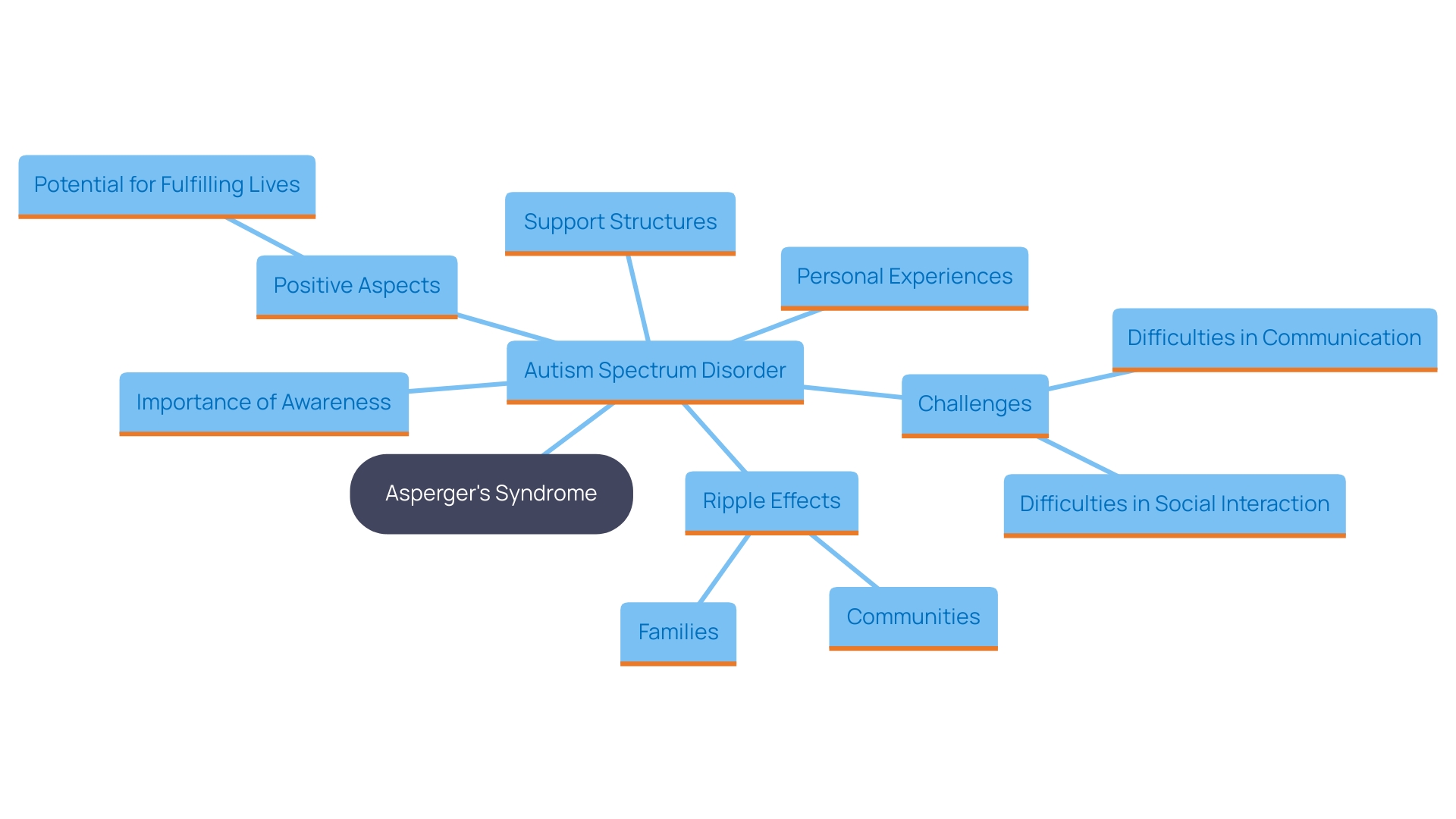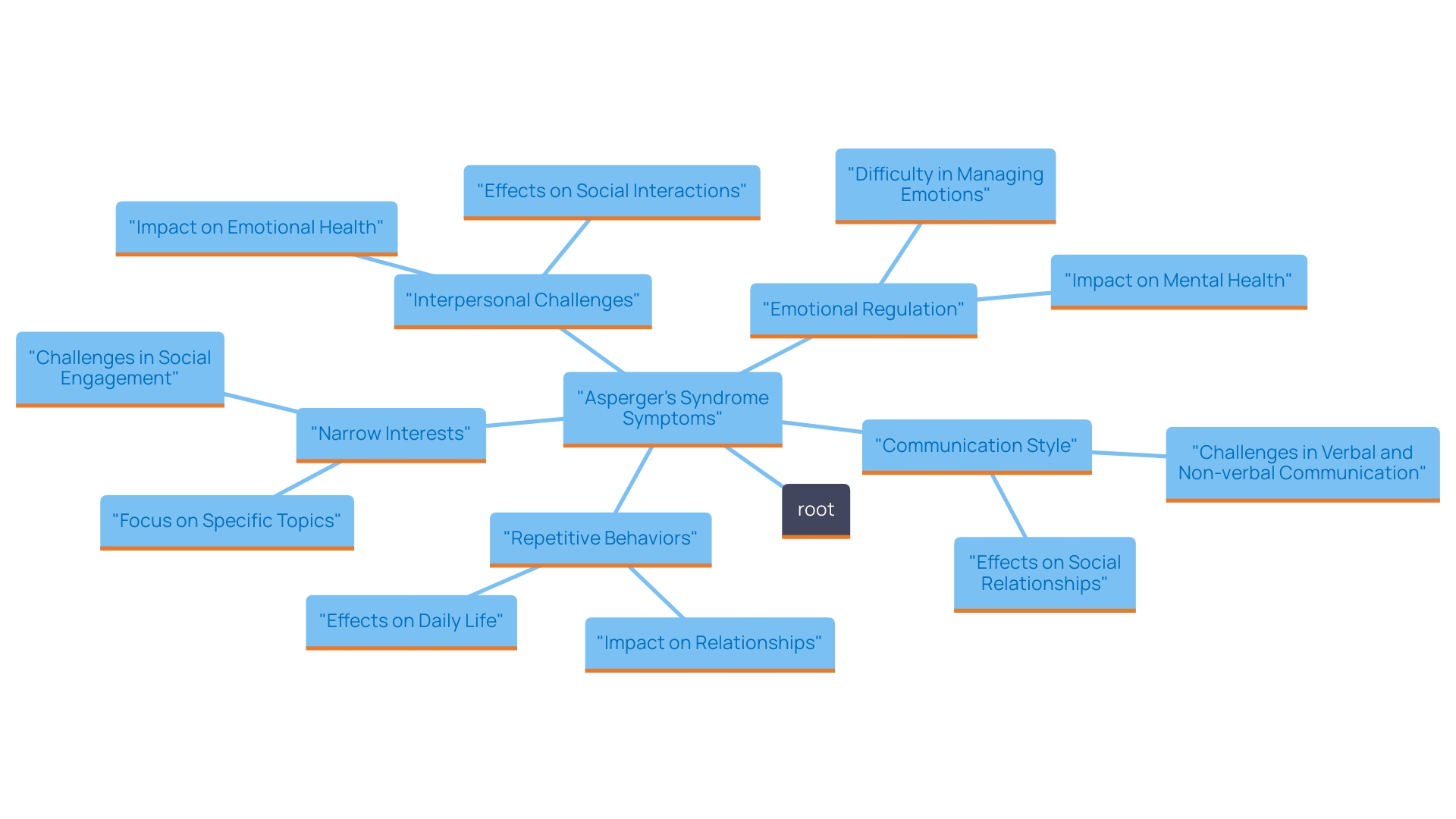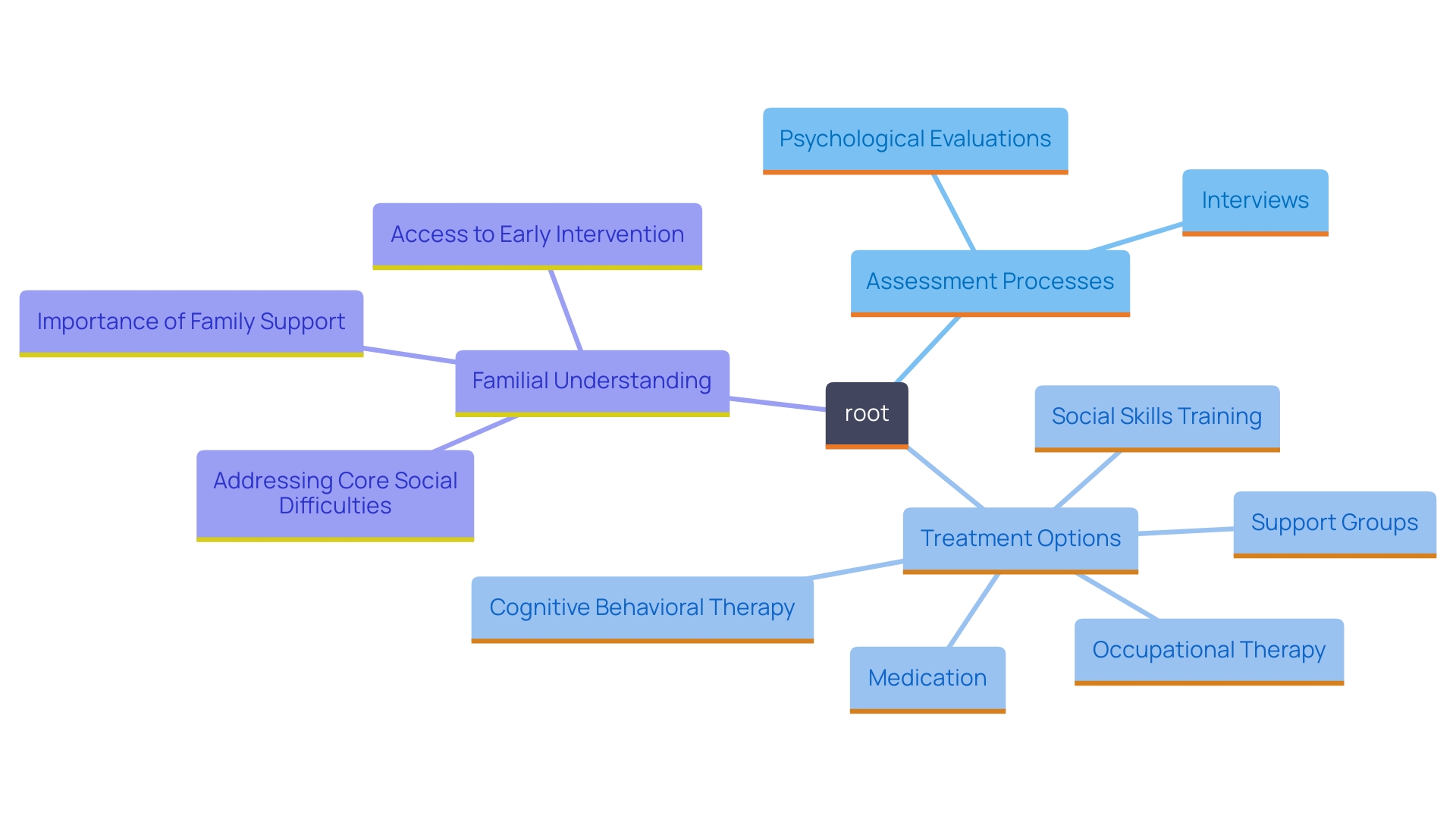Introduction
Asperger's Syndrome, now integrated into the broader spectrum of Autism Spectrum Disorder (ASD), presents a unique set of challenges for adults that extend beyond mere social interaction difficulties. Understanding this condition is essential not only for the individuals affected but also for their families and communities. With approximately 1 in 68 adults diagnosed, the need for awareness and support is more pressing than ever.
This article delves into the intricacies of Asperger's in adulthood, exploring key symptoms, effective diagnosis, and a variety of treatment approaches that empower individuals to lead fulfilling lives. By shedding light on these aspects, advocates can better navigate the complexities of Asperger's and foster environments that promote understanding, acceptance, and growth.
Overview of Asperger's Syndrome in Adults
Asperger's Syndrome, now acknowledged as part of Autism Spectrum Disorder (ASD), presents unique challenges characterized by difficulties in social interaction, nonverbal communication, and a tendency toward restricted and repetitive behaviors. Although it was previously regarded as a separate diagnosis, the present comprehension positions it within the wider ASD framework, reinforcing the notion that many individuals with Asperger's can lead rich and fulfilling lives despite their challenges.
Grasping the condition is crucial, as its effects ripple through families and communities. By recognizing the unique characteristics of individuals with Asperger's syndrome, we can promote improved communication and support structures that enhance their quality of life. For instance, Dr. Mary Doherty, a consultant anesthetist, shares her transformative journey following her son’s autism diagnosis, stating, 'It was only when my son was diagnosed as autistic that everything finally made sense.' Her insights reveal how understanding one's unique experiences can nurture self-acceptance and mental well-being.
Recent statistics show that roughly 1 in 68 individuals is diagnosed with Autism Spectrum Disorder, highlighting the significance of acknowledging and meeting their needs. Advancements in the understanding of Autism Spectrum Disorder emphasize the significance of assisting those with Asperger's syndrome and their families. As proponents, it is crucial to stay knowledgeable about the occurrence of this condition in grown-ups, as well as to share real-life experiences that highlight their strengths and challenges. Such awareness not only empowers individuals but also enriches the communities that support them, ultimately leading to improved outcomes for those affected.

Identifying Key Symptoms of Asperger's in Adults
Key symptoms of the condition in adults encompass a range of challenges that can significantly affect their daily lives and interactions with others. Understanding these symptoms is crucial for facilitating appropriate support and advocacy. The following are critical indicators:
-
Interpersonal Challenges: Adults with Asperger's syndrome frequently face challenges in participating in conventional interactions. They may misinterpret interpersonal cues, struggle to maintain conversations, and find it challenging to connect with peers, leading to feelings of isolation. According to studies, approximately 70% of individuals with Asperger's report significant difficulties in social situations, emphasizing the need for understanding and support.
-
Repetitive Behaviors: Many individuals may engage in specific routines or rituals, demonstrating a strong resistance to change. This behavior can manifest in various aspects of life, affecting flexibility and adaptability. For instance, an adult might have a set routine for their workday that, if disrupted, can lead to heightened anxiety.
-
Narrow Interests: A hallmark of Asperger's is an intense focus on particular topics, which may appear unusual or obsessive to others. While this can be a source of expertise, it may also lead to difficulties in engaging with broader interests common in social settings. A grown individual may passionately discuss a niche area of science but struggle to engage in casual conversations about current events.
-
Emotional Regulation: Adults with autism frequently struggle with understanding or expressing their emotions. This can lead to frustration, anxiety, and difficulties in navigating emotional landscapes, both personally and in relationships. Many report feeling overwhelmed in emotionally charged situations, which can affect their ability to connect with others.
-
Communication Style: Their communication often involves literal interpretations, making it challenging to grasp sarcasm or humor. Additionally, nonverbal communication cues may be easily overlooked, complicating interactions further. For example, a person may miss the subtle cues in a conversation that indicate when someone is joking, leading to misunderstandings.
Identifying these signs is essential for comprehending the distinct experiences of individuals with Asperger's disorder. As PD Dr. Martin D Ohlmeier points out, '>Asperger’s syndrome should be included in the differential diagnosis of grown-ups who exhibit the corresponding symptoms.<' By promoting awareness and support around these key symptoms, parent advocates can help create more inclusive environments for those with Asperger's, ultimately enhancing their quality of life.

Diagnosis and Treatment Approaches for Asperger's in Adults
Identifying Asperger's Disorder in individuals requires comprehensive assessments carried out by skilled experts. This process typically encompasses psychological assessments, in-depth interviews, and careful observation of behavior. According to the DSM-5 criteria, people must exhibit persistent deficits in social communication alongside restricted and repetitive patterns of behavior. Recent research suggests that Asperger's Syndrome affects approximately 62 in 10,000 adults globally, highlighting the importance of awareness and understanding of this condition.
Once a diagnosis is established, various treatment approaches can be pursued, each tailored to meet individual needs:
-
Cognitive Behavioral Therapy (CBT): This evidence-based approach is particularly effective in managing anxiety and enhancing social skills, allowing people to navigate social interactions more confidently.
-
Social Skills Training: Through structured activities, this method focuses on improving interpersonal skills, fostering better connections with others.
-
Occupational Therapy: Aimed at developing essential daily living skills and effective coping strategies, occupational therapy provides people with tools to thrive in everyday life.
-
Support Groups: These groups offer invaluable platforms for sharing experiences and gaining insights from others who face similar challenges, fostering a sense of community and understanding.
-
Medication: In some cases, medication may be prescribed to address co-occurring conditions such as anxiety or depression, supporting overall well-being.
Understanding these diverse treatment options empowers parents and advocates to seek the most effective support for adults with Asperger's. As Sula Wolff's extensive research over the past 30 years has shown, recognizing the unique needs of individuals on the subtle end of the autism spectrum is crucial for promoting their independence and well-being. As one participant noted, 'The diagnosis process brought into light that my father and grandfather had quite similar developmental histories to me... It was also quite a bonding experience for the male line in my family.' This emphasizes the importance of familial understanding and support in navigating these challenges.

Conclusion
Understanding Asperger's Syndrome in adulthood is vital for fostering supportive environments that enable individuals to thrive. The article has explored the key symptoms, such as social challenges, repetitive behaviors, and emotional regulation issues, highlighting the unique experiences faced by adults with Asperger's. By recognizing these traits, advocates can create more inclusive spaces that promote understanding and acceptance, ultimately enhancing the quality of life for those affected.
Diagnosis and treatment play a crucial role in the journey of adults with Asperger's. Comprehensive evaluations by qualified professionals, combined with tailored interventions like cognitive behavioral therapy and social skills training, offer individuals the tools necessary to navigate life's challenges. Support groups and community resources provide invaluable connections, fostering a sense of belonging and shared experience.
The message is clear: awareness, understanding, and advocacy are essential in addressing the needs of adults with Asperger's Syndrome. By empowering individuals and their families with knowledge and resources, society can create an environment that celebrates their strengths while addressing their challenges. It is through this collective effort that meaningful change can occur, leading to more fulfilling lives for those on the autism spectrum.




